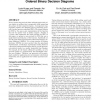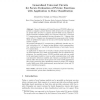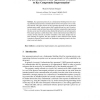38 search results - page 7 / 8 » Scalar-product based Secure Two-party Computation |
CCS
2000
ACM
13 years 9 months ago
2000
ACM
The Internet provides an environment where two parties, who are virtually strangers to each other, can make connections and do business together. Before any actual business starts...
CCS
2006
ACM
13 years 9 months ago
2006
ACM
Privacy-preserving protocols allow multiple parties with private inputs to perform joint computation while preserving the privacy of their respective inputs. An important cryptogr...
PKC
2007
Springer
13 years 11 months ago
2007
Springer
Abstract. Yao’s classical millionaires’ problem is about securely determining whether x > y, given two input values x, y, which are held as private inputs by two parties, re...
ICISC
2008
13 years 6 months ago
2008
Secure Evaluation of Private Functions (PF-SFE) allows two parties to compute a private function which is known by one party only on private data of both. It is known that PF-SFE c...
EUROPKI
2006
Springer
13 years 9 months ago
2006
Springer
Abstract. Key agreement protocols are a fundamental building block for ensuring authenticated and private communications between two parties over an insecure network. This paper fo...



